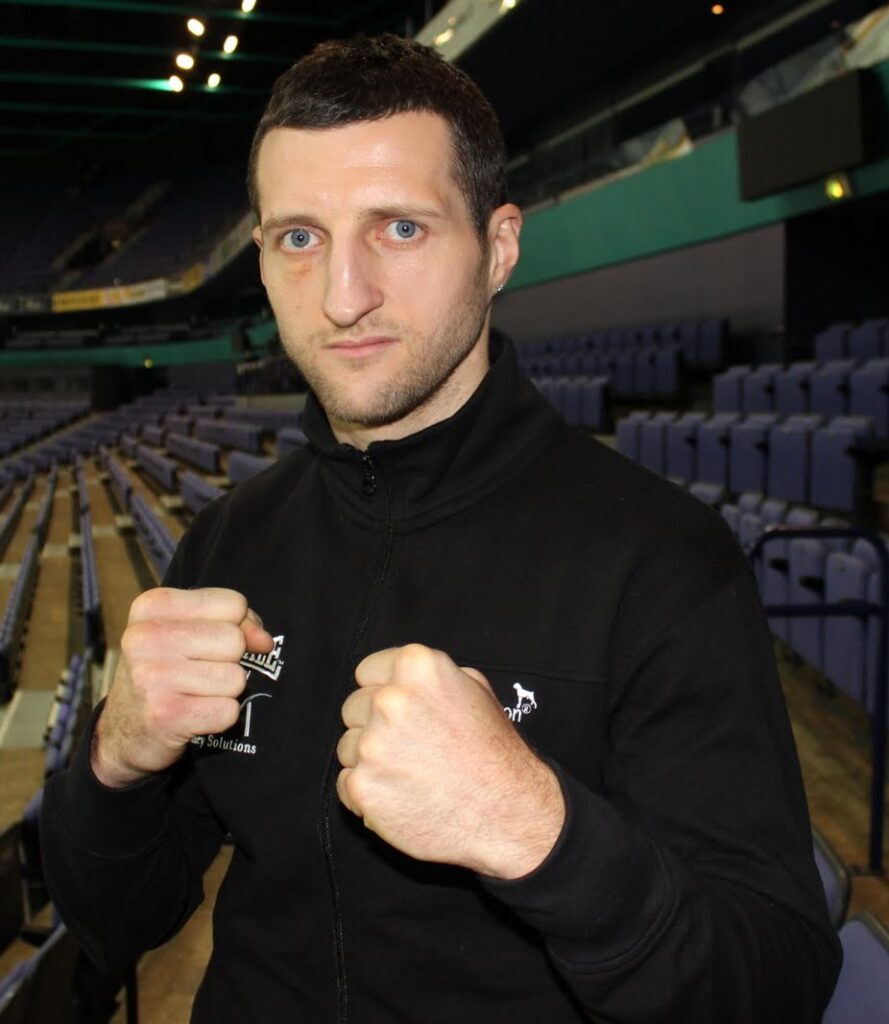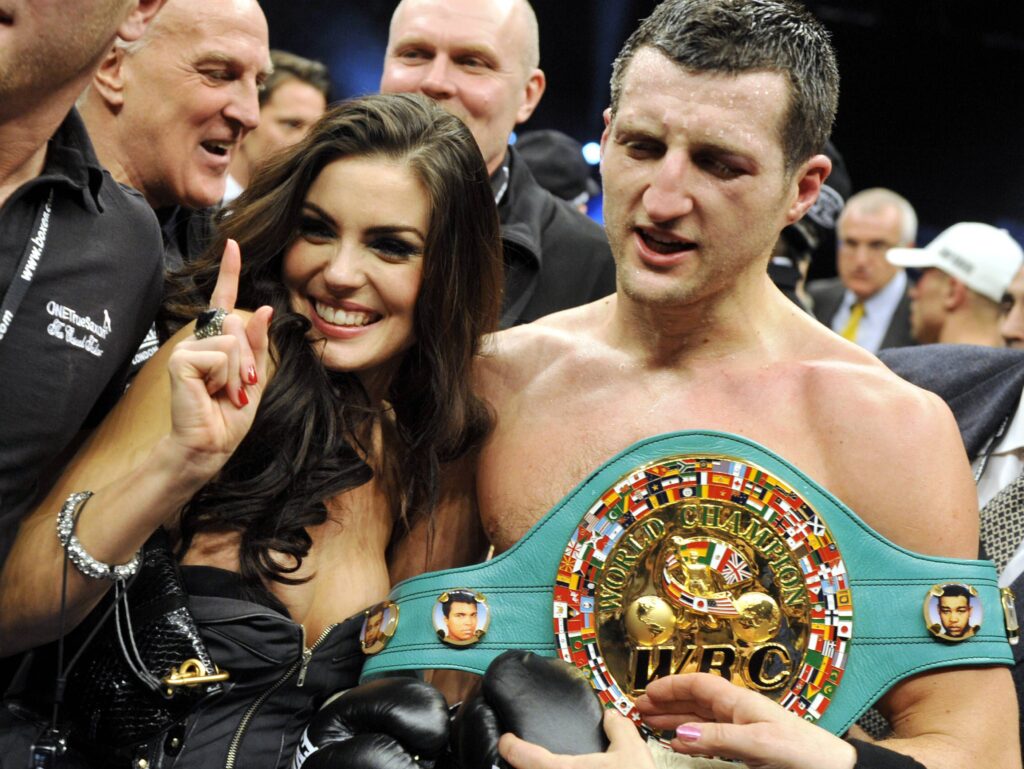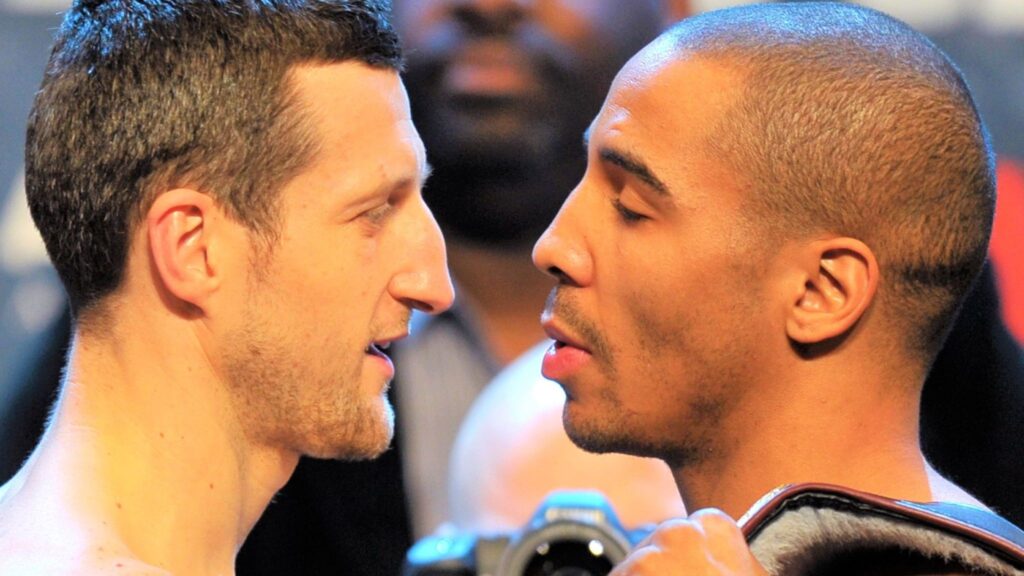Weight’s(Super middleweight) Height:6 ft 1 in (185cm) Reach 75in (191cm) Stance: Orthodox Boxing: 33-2-0(24KO)

The Cobra’s Early Life: From Nottingham to the Boxing Ring
Carl Froch’s moniker, “The Cobra,” captures the essence of his quick strikes and lethal approach inside the boxing ring, a style he honed from an early age in the working-class neighborhoods of Nottingham, England. Froch’s journey from a young boy in Nottingham to a world champion is a compelling tale of passion, determination, and the unwavering pursuit of greatness. Froch fought in the middleweight and in the super-middleweight division. Nowdays he is a boxing analyzer and critic often criticize boxers like Tyson fury and Anthony joshua.
Growing Up in Nottingham
Born on July 2, 1977, Carl Froch grew up in a city known for its rich history and vibrant culture. Nottingham, with its mix of urban and historical elements, provided a backdrop to Froch’s early life, characterized by typical childhood pursuits and the early stirrings of a boxing legend. The city, famous for its tales of Robin Hood and its sporting heritage, would soon add another legend to its lore in the form of a world-class boxer.
From an early age, Froch exhibited a keen interest in sports, displaying a natural athleticism and competitiveness that would serve him well in his future career. His upbringing in Nottingham, a city with a strong sense of community and a no-nonsense attitude, ingrained in him the values of hard work, resilience, and the importance of standing up for oneself. These values would become the cornerstones of his approach to boxing and life.
Introduction to Boxing
Carl Froch’s foray into boxing was not just a matter of chance; it was a path that seemed almost predestined, given his innate fighting spirit and physical prowess. His introduction to the sport came at a young age when he started training at a local boxing gym. This initial step into the world of boxing was more than just a hobby or a way to stay fit; it was the beginning of a lifelong passion that would define his identity and future.
Under the guidance of skilled trainers and mentors, Froch quickly developed a deep understanding of boxing fundamentals, coupled with a growing appreciation for the discipline, strategy, and mental toughness required to excel in the sport. His early experiences in the ring, from sparring sessions to amateur bouts, laid the foundation for his unique fighting style. These formative years were crucial in shaping his approach to boxing, characterized by a combination of technical skill, physical conditioning, and an unyielding will to win.

Amateur Achievements
Carl Froch’s amateur career laid the groundwork for his professional successes, providing him with a solid foundation in the fundamentals of boxing, as well as the competitive experience necessary to excel at the highest levels. His tenure in the amateur ranks was distinguished by a series of notable achievements that hinted at his future potential.
One of Froch’s crowning achievements as an amateur was securing a place in the ABA (Amateur Boxing Association) Championships, a prestigious tournament that has been a stepping stone for many of Britain’s boxing greats. Winning the ABA Championships not only bolstered Froch’s confidence but also put him on the radar of boxing aficionados and professionals alike. His success in the amateur circuit demonstrated his technical skills, tactical intelligence, and the heart of a fighter, all of which would become hallmarks of his professional career.
Decision to Turn Professional
The decision to turn professional is a significant milestone in any boxer’s career, marking the transition from the amateur ranks to the rigors and challenges of professional boxing. For Carl Froch, this decision came after careful consideration of his amateur successes and the potential for greater achievements. In 2002, Froch made the leap to the professional arena, setting his sights on becoming a world champion.
Turning professional allowed Froch to focus entirely on boxing, dedicating himself to rigorous training, refining his technique, and facing off against increasingly skilled opponents. This period of his career was characterized by a relentless work ethic and a deep commitment to achieving his goals. Froch’s professional debut was a statement of intent, showcasing his skills and determination to a wider audience and signaling the arrival of a new contender in the super-middleweight division.
The early years of Froch’s professional career were marked by a steady ascent through the ranks, with each fight serving as an opportunity to prove his worth and edge closer to a title shot. His resilience, power, and ability to deliver thrilling performances quickly earned him a reputation as a formidable boxer and a fan favorite. The transition to professional boxing also introduced Froch to the business side of the sport, where he demonstrated savvy and ambition, aligning himself with promoters and managers who could help propel his career forward.

Signature Fights and Rivalries: Carl Froch’s Defining Moments
Carl Froch vs Jermain Taylor
In the dramatic boxing match for the IBF title, Carl Froch faced Jermain Taylor and secured a memorable victory. Broadcasted live by Sky Sports, this intense fight took place on April 25, 2009, at the MGM Grand in Foxwoods Resort, Mashantucket, Connecticut. Froch, defending his IBF super middleweight title, was trailing on the scorecards until the final round. In a stunning turnaround, he knocked Taylor down with a powerful combination in the 12th round and followed up with a flurry of punches. The referee stopped the fight with just 14 seconds left, allowing Froch to retain his title by TKO in a bout that has since become a classic example of resilience and determination in boxing history.
Battles with Jean Pascal
The 2008 showdown with Jean Pascal for the vacant WBC super-middleweight title is often cited as one of Froch’s signature fights. This intense, back-and-forth battle saw Froch claim a unanimous decision victory after twelve rounds of non-stop action. The fight was notable for its sheer competitiveness and displayed Froch’s resilience, skill, and determination. Winning the WBC title not only solidified Froch’s place among the elite in the super-middleweight division but also marked the beginning of his reign as a world champion.
Rivalry with George Groves
Carl Froch’s rivalry with George Groves is perhaps one of the most intense and publicized in British boxing history. Their first meeting in November 2013 was surrounded by immense hype and delivered an epic encounter. Froch was knocked down early in the fight but battled back to stop Groves controversially in the ninth round, retaining his IBF and WBA titles. The controversial ending fueled demand for a rematch, which took place in May 2014 at Wembley Stadium before 80,000 fans. In the rematch, Froch silenced his critics with a spectacular eighth-round knockout, one of the most iconic moments of his career, solidifying his legacy and ending the rivalry on his terms.
Other Notable Opponents
Beyond Pascal and Groves, Froch’s career is studded with significant fights against other top-tier boxers that further underscored his prowess and fighting spirit.
- Mikkel Kessler: Froch’s battles with Danish super-middleweight Mikkel Kessler are highlights of his career. After losing to Kessler in a closely contested match in 2010, Froch avenged his defeat in a 2013 rematch, unifying the WBA and IBF super-middleweight titles in a fight that showcased his improved strategy and determination.
- Andre Ward: In 2011, Froch faced Andre Ward in the Super Six World Boxing Classic final, a unification bout for the WBA and WBC super-middleweight titles. Despite losing to Ward, this fight against one of the division’s best further demonstrated Froch’s willingness to face top competition and solidified his reputation as a fearless competitor.
- Arthur Abraham: Froch’s decisive victory over Arthur Abraham in 2010 for the WBC super-middleweight title was a masterclass in boxing. His dominant performance showcased his tactical intelligence and solidified his status as one of the division’s best.
Froch’s Fighting Style and Strategy: The Cobra’s Technique Unveiled
Analysis of Froch’s Technique
Froch’s fighting style was a unique blend of traditional boxing skills and his own distinctive attributes. He was known for his exceptional durability, allowing him to absorb punishment while waiting for opportunities to launch his own offensive. Froch’s ability to withstand pressure and then retaliate with precise, powerful strikes was a key aspect of his approach in the ring.
One of the hallmarks of Froch’s technique was his use of the jab. While not always orthodox in execution, his jab was effective in keeping opponents at bay and setting up more powerful combinations. Froch’s right hand, in particular, became legendary for its knockout power. He had the ability to throw it as a counter-punch or lead with it in exchanges, often catching opponents off-guard.
Froch’s footwork, often underrated, allowed him to maintain optimal positioning, enabling him to leverage his reach and power effectively against different types of opponents. His ring generalship, the ability to control the pace and space of the fight, was a testament to his experience and understanding of the sport.
Preparation Methods
Carl Froch’s success was not just a product of his natural talent but also his rigorous preparation methods. His training regimen was comprehensive, focusing on physical conditioning, technical skills, and mental fortitude.
- Physical Conditioning: Froch placed a high emphasis on conditioning, ensuring that he could maintain his intensity and work rate throughout the later rounds of a fight. His training included a mix of traditional boxing workouts, strength training, and cardiovascular exercises, aimed at maximizing his stamina and resilience.
- Technical Training: Froch and his team meticulously studied opponents, identifying strengths and weaknesses to exploit. Training sessions often included sparring with partners who could mimic the style of his upcoming adversaries, allowing Froch to adapt his strategy and technique to different fighting styles.
- Mental Preparation: Froch’s mental toughness was as crucial to his success as his physical abilities. He engaged in various mental conditioning techniques, including visualization and sports psychology, to ensure that he remained focused and confident under the bright lights of the world stage.
Championship Titles and Legacy: The Indelible Mark of Carl Froch

Titles Won
Throughout his illustrious career, Froch claimed multiple world championships across prestigious boxing organizations, underlining his dominance in the super-middleweight division. Among his most notable achievements are:
- WBC Super Middleweight Title: Froch won the WBC title multiple times, first capturing it in a memorable battle against Jean Pascal in December 2008. His reign included successful defenses against formidable opponents, showcasing his skills and resilience at the highest level of the sport.
- WBA Super Middleweight Title: Froch’s thrilling victory over Mikkel Kessler in their 2013 rematch added the WBA super-middleweight title to his collection, marking him as a unified champion and one of the division’s best.
- IBF Super Middleweight Title: The IBF belt was added to Froch’s accolades following his win against Lucian Bute in 2012. This victory was particularly significant as it came against an undefeated champion, further cementing Froch’s status as one of the elite fighters in the world.
These championships, along with Froch’s other victories, contributed to a career that was both successful and storied, highlighting his ability to compete and win against the best in the world.
Hall of Fame Consideration
Carl Froch’s accomplishments inside the ring make him a strong candidate for induction into the International Boxing Hall of Fame. His record, featuring wins over multiple world champions and his participation in some of the most memorable fights of his era, speaks to his excellence and longevity in the sport. The criteria for Hall of Fame induction include achievements as a boxer, sportsmanship, and contributions to the sport, all areas where Froch has excelled.
Impact on Boxing
Froch’s impact on boxing extends beyond his championship titles. He was known for his willingness to face any challenger, his never-say-die attitude in the ring, and his ability to draw crowds with his exciting fighting style. These attributes helped revitalize the super-middleweight division and brought attention to British boxing on the international stage.
FAQs About Carl Froch
How did Carl Froch earn the nickname “The Cobra”?
Carl Froch earned the nickname “The Cobra” due to his distinctive fighting style, characterized by his quick striking ability and the power of his punches. Much like a cobra that strikes its prey with speed and precision, Froch was known for his ability to deliver sudden, powerful blows that could change the course of a fight in an instant. This nickname encapsulates his approach in the ring, where his combination of speed, timing, and power made him one of the most feared super-middleweight boxers of his time.
What are Carl Froch’s most memorable fights?
Carl Froch’s career is filled with memorable fights, but a few stand out due to their significance and the drama they brought to the ring:
- Jean Pascal (December 2008): This fight for the vacant WBC super-middleweight title was a hard-fought battle that saw Froch emerge victorious and claim his first world title.
- Mikkel Kessler (April 2010 and May 2013): Froch’s bouts with Kessler were both epic encounters. The first was a loss that Froch avenged in their second meeting, solidifying his legacy in a thrilling rematch.
- George Groves (November 2013 and May 2014): Froch’s two fights against Groves, particularly their rematch in front of 80,000 fans at Wembley Stadium, were among the most talked-about British fights, highlighted by Froch’s knockout victory in their second encounter.
How has Carl Froch contributed to boxing after his retirement?
After retiring from professional boxing, Carl Froch has continued to contribute to the sport in several ways. He has become a respected boxing analyst and commentator, sharing his insights and expertise on major fights for various broadcasting networks. Froch is also involved in mentoring young fighters, offering guidance based on his extensive experience in the ring. His involvement in charitable activities and initiatives aimed at promoting boxing at the grassroots level further exemplifies his commitment to the sport.
What lessons can young boxers learn from Froch’s career?
Young boxers can learn numerous lessons from Carl Froch’s career, including the importance of resilience, dedication, and strategic thinking. Froch’s journey shows that overcoming setbacks, such as his early career losses, is a part of the path to success. His meticulous approach to training and preparation highlights the need for discipline and hard work, while his ability to adapt his fighting style against different opponents underscores the value of flexibility and intelligence in the ring.
How does Froch view his legacy in the boxing world?
While Carl Froch has often expressed humility regarding his own legacy, it’s clear that he takes pride in the hard-fought battles and world titles that have marked his career. Froch views his legacy as one of determination, resilience, and excellence within the super-middleweight division. He hopes to be remembered as a fighter who always gave his all in the ring, entertained the fans, and left a lasting impact on British boxing.
What are Froch’s views on the current state of the super-middleweight division?
Carl Froch maintains a keen interest in the super-middleweight division and often shares his views on its current state through his commentary and analysis work. He has praised the talent and depth within the division, highlighting the emergence of new champions and exciting prospects. Froch believes the super-middleweight division remains one of the most competitive and compelling weight classes in boxing, offering great matchups and potential for memorable fights. His commentary often includes insights into how current fighters could learn from the past, including his own experiences, to achieve greatness in the sport.